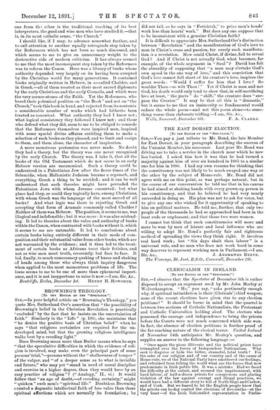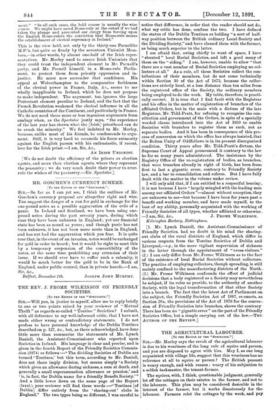CLERICALISM IN IRELAND.
[TO THE EDITOR OF THE " SPECTATOR...1
Sin,—I observe that the Spectator of December 5th is rather disposed to accept an argument used by Mr. John Morley at Wolverhampton. "He," you say, "asks pertinently enough why, if spiritual intimidation is their [Clericals'] chief weapon,
none of the recent elections have given rise to any election petitions ? " It should be borne in mind that the quarrel is between two sections of Catholic Nationalists, the Protestant and Catholic Universities holding aloof. The electors who possessed the courage and independence to bring the priests before the Courts were not much concerned which side won. In fact, the absence of election petitions is further proof of the far-reaching nature of the clerical terror. United Ireland
of November 14th anticipates Mr. Morley's question, and supplies an answer in the following language :— "Once again the pious illiterate and the political priest have triumphed over the forces of Independent Nationalism. Why seek to disguise or hide the bitter, shameful, fatal truth ? For the sake of our religion and of our country and of the cause of Home-rule, we of the National Party have smothered our feelings, and refrained from telling the world what are the forces that now predominate in Irish public life. It was a mistake. Had we faced the difficulty at the outset, and secured the imprisonment, with bard labour, of half-a--dozen priests for conspicuous and glaring violation of the law against corrupt and illegal practices, we would have had a different story to tell of North Sligo and Carlow, and of Cork. But we feared to let the English people know that the priests can to-day control the elections of five-sixths—at the very least—of the Irish Nationalist representation in Pulls,- inent." "In 011 such cases, the bold course is usually the wise course. We might have saved Home-rule at the outset if we had taken the plunge and prevented our clergy from forcing upon the English Home-rulers the conviction that Home-rule means the establishment of clerical supremacy in Ireland."
This is the view held, not only by the thirty-one Parnellite M.P.'s, but quite as firmly by the seventeen Unionist Mem- bers,—in other words, by almost one-half of the Irish repre- sentatives. Mr. Morley used to assure Irish Unionists that they could trust the independent element in Mr. Parnell's party, and Mr. Parnell himself, in a Home-rule Parlia- ment, to protect them from priestly oppression and in- justice. He must now surrender that confidence. His appeal at Wolverhampton to the comparative feebleness of the clerical power in France, Italy, &c., seems to me wholly inapplicable to Ireland, which he does not propose to make independent. The argument, too, ignores the large Protestant element peculiar to Ireland, and the fact that the French Revolution weakened the clerical influence in all the Catholic countries of the Continent, and particularly in France. We do not need these more or less ingenious arguments from analogy when, as the Spectator justly says, "the experience of the last year has shown what the [Irish] priesthood can do to crush the minority." We feel indebted to Mr. Morley, because, unlike most of his friends, he condescends to argu- ment. Still, it is very hard to reconcile his fierce animosity against the English parson with his enthusiastic, if recent, love for the Irish priest.—I am, Sir, &c.,
AN IRISH UNIONIST.
[We do not doubt the efficiency of the priests as election agents, and more than election agents, where they represent the peasantry ; we do very much doubt their power to over- rule the wishes of the peasantry.—En. Spectator.]











































 Previous page
Previous page